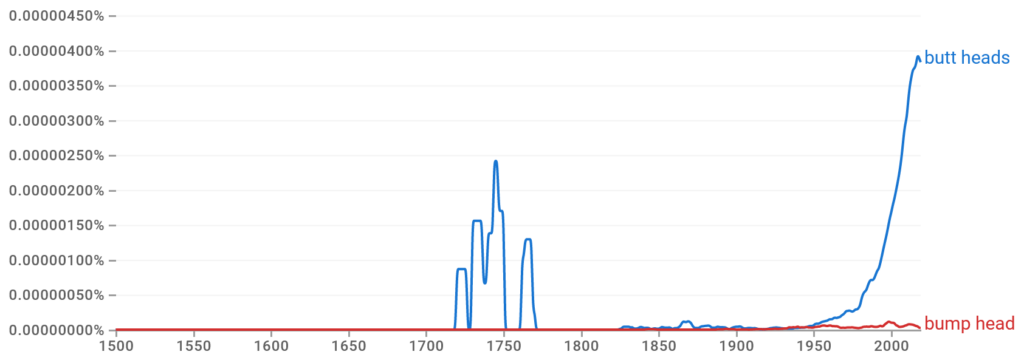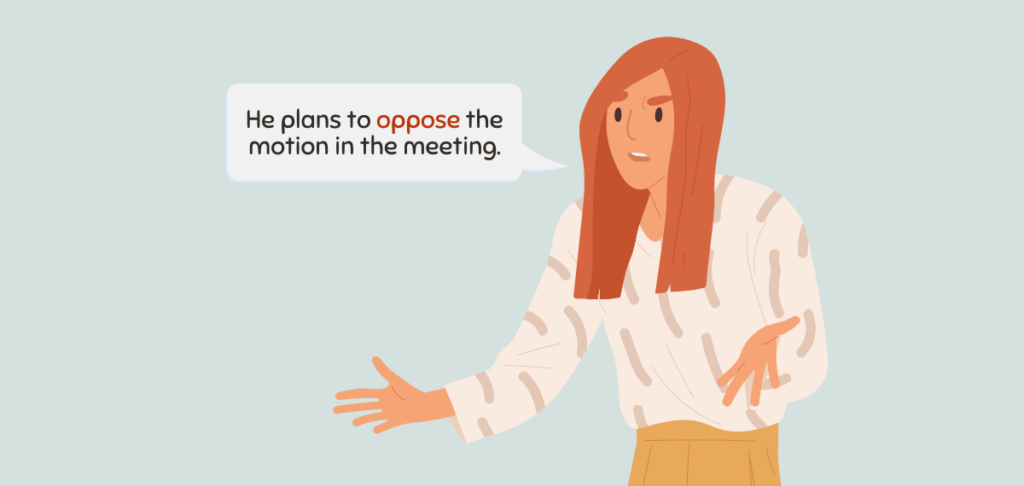Butt heads is an idiomatic expression that means to strongly disagree or clash with someone, often in a confrontational or argumentative manner.
Idioms like butt heads (bump heads) are phrases or expressions whose meaning cannot be understood from the literal definitions of their individual words. They are popular in casual or informal speech and are generally used to create metaphors or help further illustrate a point an author is trying to make.
In this guide, I’ll delve into the idiom’s deeper meaning, origin, and correct usage. I’ll also provide a few related terms and phrases, sentence examples, and tips for effectively using the idiom in your material. So, keep reading to learn more about the idiom butt heads, and take the quick quiz at the end to test your knowledge of the idiom.

What Does the Idiom Butt Heads Mean?
The idiom butt heads means to come into conflict, to argue, clash, be in opposition, or to disagree strongly. It implies a situation where two individuals or groups have conflicting opinions, ideas, or personalities, leading to friction and disagreement.
Merriam-Webster defines the expression as “to express different opinions about something often angrily.” Similarly, Britannica defines it as “to disagree about how something should be done.”
So, here’s a little story from the trenches: I recently found myself butting heads with my boss about this project idea. I was all for giving students something that involved a mix of skills instead of the usual sit-down paper during exam week. It got a bit heated initially, but he came around once I laid out my reasons. We definitely had a clash of opinions, but in the end, logic prevailed.
Is Butt Heads or Bump Heads?
Both are correct. Butt heads is mostly used in North American English, and bump heads is mostly used in British English, though the phrase butt heads is five times as popular as the phrase bump heads.
How Is the Idiom Butt Heads Commonly Used in Context?
The idiom butt heads captures the essence of disagreements and conflicts, depicting situations where individuals or groups clash in opinions or ideas. To explore the varied applications of this expressive phrase, the following sections provide valuable insights:
What Are the Different Ways to Use the Idiom Butt Heads?
- Workplace conflict: “The two managers often butt heads during meetings, each advocating for their own strategies.”
- Family disagreement: “Siblings tend to butt heads over trivial matters, but at the end of the day, they always find a way to reconcile.”
- Political opposition: “In the heated debate, the two politicians continued to butt heads over the proposed tax reform.”
- Team project challenges: “As the project deadline approached, team members began to butt heads over how to allocate resources effectively.”
- Creative differences: “The artists in the studio occasionally butt heads when deciding on the visual direction for a new project.”
- Friendship tensions: “Close friends can butt heads too, especially when making important decisions that impact the entire group.”
- Business partnership challenges: “The business partners began to butt heads over conflicting visions for the future of the company.”
- Academic debates: “During the academic conference, scholars from different disciplines would occasionally butt heads over theoretical frameworks.”
Where Can You Find Examples of the Idiom Butt Heads?
Most idiomatic phrases are used in casual communication and are considered informal patterns of speech or even slang in some situations. Because of this, you will more likely see the idiom butt heads used in:
- Informal conversations
- Literature
- Movies and TV shows
- News articles
- Online forums and social media
- Speeches and interviews
- Personal narratives
Online editorials and gossip columns are notorious for using the idiom to highlight conflict:
The Jungle Jailhouse twist saw Jacqueline Jossa, Andrew Maxwell and Kate Garraway butt heads in Thursday’s episode of I’m A Celebrity… Get Me Out Here. (The Daily Mail)
He said: “Fans can expect to watch Calvin and Joe continuously bump heads with Forty [the owner of the store, played by James Scully] throughout the season. (Newsweek)
What Are Some Tips for Using the Idiom Butt Heads?
- Informal contexts: Butt heads is an informal expression, so it’s best suited for casual conversations, discussions among friends, and less formal writing.
- Conflict or disagreement: Use the idiom to convey a sense of conflict, disagreement, or opposition between individuals or groups.
- Figurative usage: Remember that butt heads is a figurative expression, suggesting a clash of ideas or personalities rather than a physical confrontation.
- Know your audience: Be mindful of your audience and the context. While it’s appropriate for casual conversations, it may not be suitable in more formal settings.
- Consider alternatives: If you’re looking for variety, consider using alternative expressions.
- Provide context: When using the idiom, provide enough context to ensure your audience understands the nature of the conflict or disagreement.
- Avoid overuse: Like any idiom, using it sparingly can be more effective. Overusing expressions can make your language sound repetitive.
What Is the Origin of the Idiom Butt Heads?

The origin of the idiom butt heads is believed to have originated from the habit of horned animals running at each other and colliding in the form of a headbutt. This behavior is well-known in the animal kingdom. The American Bighorn Sheep is particularly known for this practice, and during rutting season, the sound of their combat can carry a long distance.
How Did the Idiom Evolve Over Time?
The expression butting heads creates an image of two people going at one another with their heads lowered, similar to bighorn sheep (and other ungulates) in combat. Of course, this image is slightly ridiculous, but the analogy of a disagreement is well illustrated when using the idiom in a modern context.
What Are Some Related Terms to Butt Heads?
To best understand its idiomatic use, you need to look at its related terms and phrases. Synonyms and antonyms can provide proper sentence placement and context.

Synonyms
Here are some synonyms that express conflict or strong disagreement:
- Clash
- Confront
- Disagree
- Oppose
- Contradict
- Quarrel
- Differ
- Clash of ideas
Antonyms
Here are some antonyms that represent the opposite of conflict or disagreement:
- Cooperate
- Agree
- Harmonize
- Collaborate
- Conciliate
- Unify
- Amicably resolve
- Work in tandem
Butt (Bump) Heads: Test Your Knowledge!
Choose the correct answer.
Let’s Review
The idiom butt heads is used to explain the notion of conflicts and clashes that arise from opposing viewpoints or personalities. It highlights the challenges and tensions arising when individuals or groups clash in their ideas or approaches.
The idiom is widely believed to have originated from the physical head butting of different species of ungulates when in a rut. This clash highlights the challenges they present to one another, similar to our own idiomatic use of butting heads—which explains a conflict or confrontation between two or more people.
Armed with this understanding, you’re now ready to seamlessly incorporate the idiom into your communication. If you’re hungry for more enriching idiomatic expressions, explore our site for a treasure trove of guides. Dive in and discover the colorful tapestry of expressions that add flair and depth to the English language. Happy reading!
